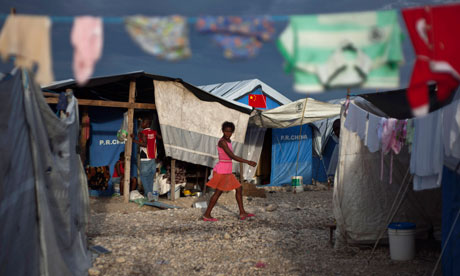http://online.wsj.com/article/
Africa exemplifies how aids spoils economic growth and discourages democratic reform.
The Wall Street Journal
MARCH 31, 2011
By MARIAN L. TUPY
Mr. Tupy is a senior fellow at the Legatum Institute in London. [www.li.com/ResearchTeam.aspx]
An indebted British government released its budget last week and, as promised, cut not one penny from its handouts to poor countries. Rather, increasing Western aid to Africa has become a mark of political piety and good citizenship. According to Prime Minister David Cameron, "We do have a moral responsibility, as one of the richest countries in the world, not to give up on [developing nations] just because we are having a difficult time at home."
Remarkably, this notion persists in the face of overwhelming evidence that such "aid" does the world's poor more harm than good. In North Africa foreign economic aid has propped up Arab dictators for decades. In sub-Saharan Africa it has stifled political and economic freedom.
Aid advocates often speak of wealth as if it were a pot of found gold that should be redistributed according to the whims of the elite. In 2006, for example, Irish singer Bob Geldof criticized the government of New Zealand, saying "The pathetic 0.27% that this government gives to the poorest people on the planet . . . is a disgrace." Yet every dollar produced in a market economy comes with a property right attached. The creators of wealth—be they workers in large corporations or small-business owners—have a right to expect good stewardship of tax revenue. Unfortunately that has not been the case.
Lord Peter Bauer, the late British economist, once wrote that foreign aid is "an excellent method for transferring money from poor people in rich countries to rich people in poor countries." Indeed, over the last half-century, hundreds of billions in foreign-aid dollars, pounds and euros have been stolen or wasted. In 2002 then-Nigerian president Olusegun Obasanjo estimated that African leaders pocketed at least $140 billion between 1960 and 2000. Andrew Mitchell, now Britain's secretary of state for international development, promised in 2009 when he was still an Opposition Member that under Mr. Cameron, "Britain's generosity will be matched by a relentless drive for value for money. . . . We will demand transparency, accountability and real results from all our aid." In truth, no one knows how to achieve such transparency and accountability in countries without free media, fair elections, independent judiciaries, strong civil societies and parliamentary supervision.
And so today Africa is filled with dilapidated airports and empty factories that were built at great expense by donor countries but failed to reduce African poverty. World Bank data shows that Africa received almost 12 times as much aid per person as India between 1975 and 2005. Yet over the same period, India grew at an average annual rate of 3.5%, while Africa shrunk at a rate of 0.16% per year. In fact, at least five aid-recipient countries in Africa were poorer in 2009 than they were in 1960. India shows that economic liberalization and democracy is much more effective at creating prosperity than international charity.
To compound the problem, foreign aid tends to discourage economic and democratic reforms, both directly and indirectly. Since many African governments continue to receive much of their revenue from outside donors, they are often indifferent to the well-being of their countries' private sectors, which in the rest of the world are the engine of growth, jobs and government revenue. In much of Africa, the private sector is an afterthought, and the best jobs can be found in parastatals and state monopolies. So it's unsurprising that Africa remains the least economically free continent in the world.
Foreign aid has thus also undermined democratization in Africa. A vibrant private sector is a source of rising incomes and wealthier citizenry, and a populace that has more to lose from arbitrary rule is more likely—and able—to demand political representation and create an independent civil society.
Aid has also retarded democratic evolution by enabling dictators to repress opposition. Paul Collier of Oxford University estimates that aid financed up to 40% of African governments' military spending between 1960 and 1999. Since most of Africa's conflicts are internal, it is very likely that the continent's leaders used some of that aid-financed weaponry to subdue domestic dissent.
The tide might be turning. In the U.S., the House of Representatives voted this month to cut the aid budget. And last week former British Cabinet Minister Peter Mandelson told a conference in London that "Most of the aid we have sent to Africa over the last five decades has probably, in the main, been wasted as far as growth is concerned." If only politicians could remember that when they're actually in office.
While it may occasionally make a positive difference in individual lives, aid harms economic growth and democratization and, in the long run, makes African societies less, not more, prosperous. By cutting aid, the West could not only save their taxpayers some money, but also benefit the victims of their supposed support: ordinary Africans.
Mr. Tupy is a senior fellow at the Legatum Institute in London.
http://online.wsj.com/article/
























